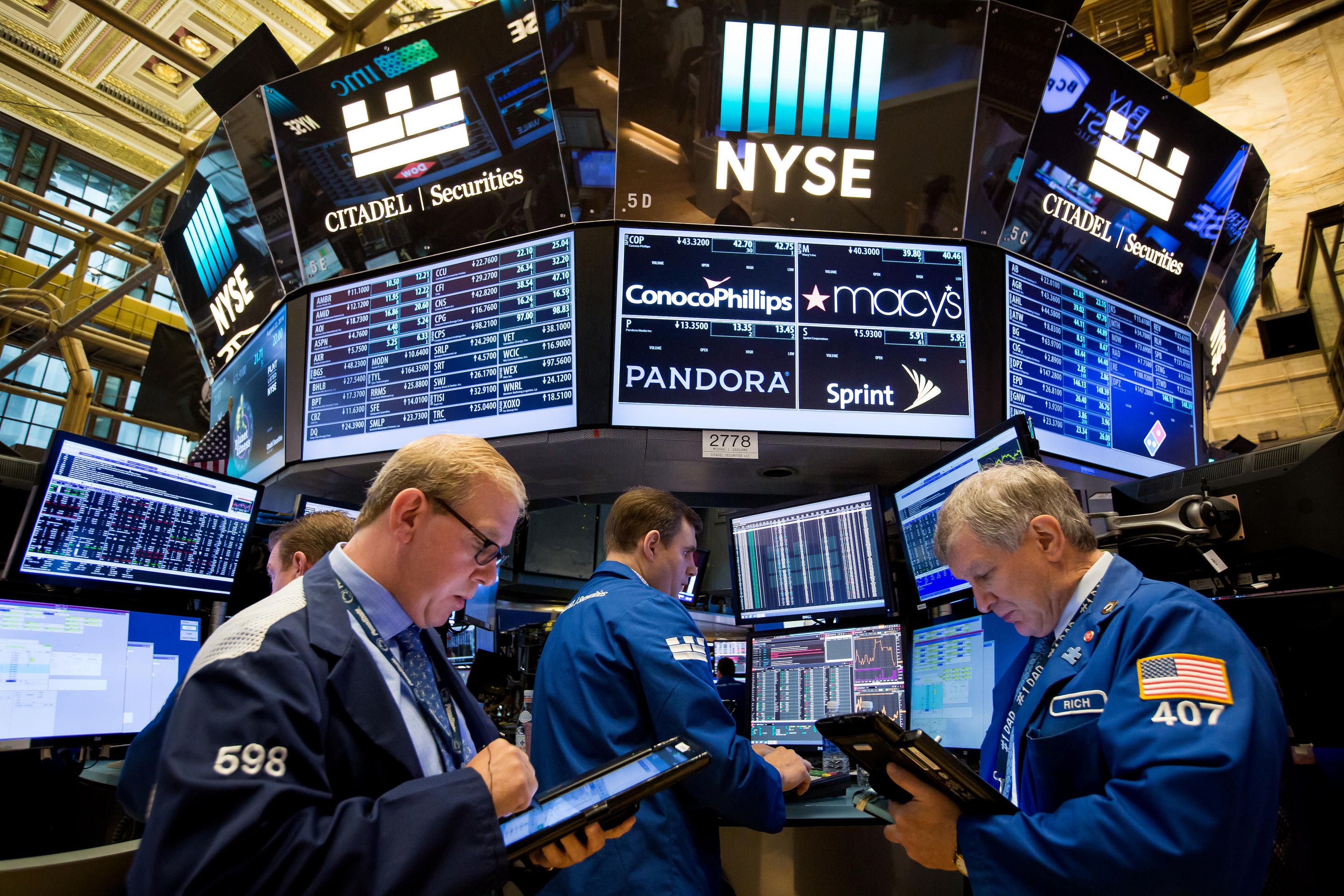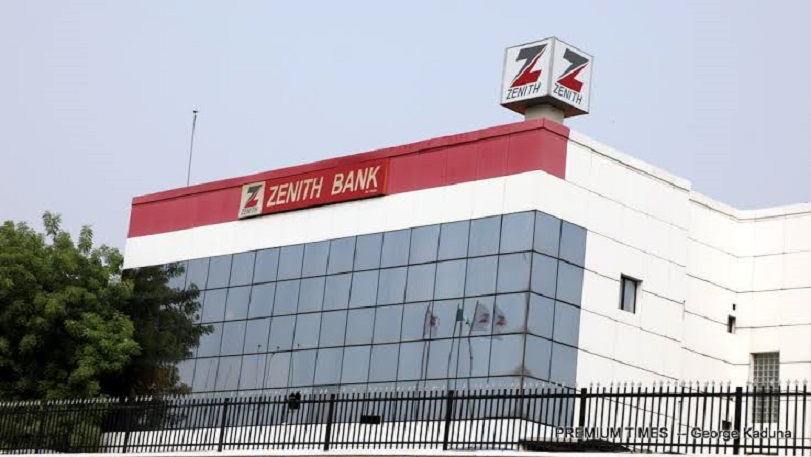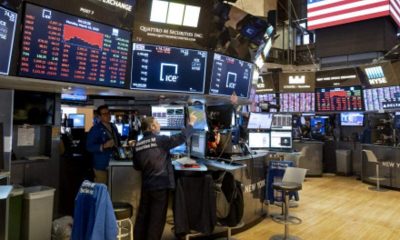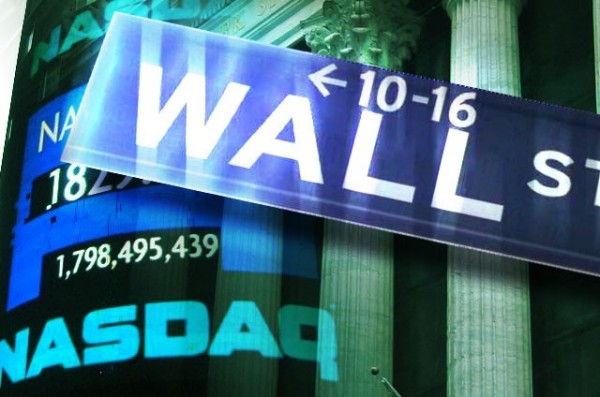Economy
US Stocks Open Lower on Trade Deal Skepticism

By Investors Hub
The major U.S. index futures are pointing to a lower opening on Tuesday, with stocks likely to give back ground following the rally seen in the previous session.
Profit taking may contribute to initial weakness on Wall Street, as traders cash in on the strong gains posted on Monday in reaction to the trade war truce reached by President Donald Trump and Chinese President Xi Jinping.
Uncertainty about whether the 90-day truce will give the U.S. and China enough time to reach a long-term trade agreement may inspire traders to cash in on yesterday?s strong upward move.
News that U.S. Trade Representative Robert Lighthizer, one of Trump?s more hawkish advisors on trade with China, has been tapped to lead the negotiations has added to the skepticism.
Trump has appeared optimistic about the potential for an agreement, claiming U.S. relations with China have taken a ?big lead forward? as a result of his meeting with XI.
?Very good things will happen,? Trump said in a post on Twitter. ?We are dealing from great strength, but China likewise has much to gain if and when a deal is completed. Level the field!?
?President Xi and I have a very strong and personal relationship,? he added. ?He and I are the only two people that can bring about massive and very positive change, on trade and far beyond, between our two great Nations.?
Overall trading activity may be somewhat subdued, however, with a lack of major U.S. economic data likely to keep some traders on the sidelines.
Tomorrow?s national day of mourning for former President George H.W. Bush may also limit trading activity, as the NYSE and the Nasdaq will be closed on the day and the release of most economic data has been postponed.
After moving sharply higher at the open, stocks gave back some ground but managed to remain firmly positive throughout the trading session on Monday. With the advance on the day, the major averages added to the substantial gains posted last week.
The major averages moved roughly sideways for much of the session before closing significantly higher. The Dow surged up 287.97 points or 1.1 percent to 25,826.43, the Nasdaq soared 110.98 points or 1.5 percent to 7,441.51 and the S&P 500 shot up 30.20 points or 1.1 percent to 2,790.37.
The initial jump on Wall Street reflected a positive reaction to the highly anticipated meeting between Trump and Xi over the weekend.
At the meeting, Trump and Xi agreed to a 90-day truce in the escalating trade war between the world’s two largest economies as they work to reach a long-term trade deal.
A White House statement said Trump agreed not to raise the tariffs on $200 billion worth of Chinese goods to 25 percent from 10 percent on January 1st as planned.
In return, China agreed to purchase a “not yet agreed upon, but very substantial, amount” of agricultural, energy, industrial, and other product from the U.S.
The White House said the U.S. and China will use the next 90 days to attempt to reach an agreement on issues such as forced technology transfer, intellectual property protection, and non-tariff barriers.
If the two countries are not able to reach an agreement by the end of the time period, the 10 percent tariffs on Chinese goods will be raised to 25 percent.
In remarks to reporters aboard Air Force One, Trump called the agreement with Xi an “incredible deal,” claiming it will have an “incredibly positive impact” on “every type of product.”
Trump also said China will be “opening up” and “getting rid of tariffs,” stating in a subsequent post on Twitter that China has agreed to reduce and remove tariffs on cars coming into the country from the U.S.
Paul Ashworth, Chief U.S. Economist at Capital Economics, noted Trump ripped up an earlier trade deal with China negotiated by Commerce Secretary Wilbur Ross.
“We suspect that since he negotiated this deal himself, Trump will be much more reluctant to torpedo it when his own personal reputation is on the line,” Ashworth said.
He added, “Nevertheless, his own administration includes plenty of China hawks who are pushing the protectionist agenda, so we suspect China will have to offer a little more than the minor concessions that South Korea, Mexico and Canada agreed to reach trade deals with the U.S.”
On the U.S. economic front, the Institute for Supply Management released a report showing an unexpected acceleration in the pace of growth in manufacturing activity in the month of November.
The ISM said its purchasing managers index climbed to 59.3 in November after falling to 57.7 in October, with a reading above 50 indicating growth in manufacturing activity. Economists had expected the index to edge down to 57.5.
Meanwhile, a separate report from the Commerce Department showed construction spending unexpectedly edged lower in October.
Energy stocks showed a substantial move to the upside on the day, benefiting from a sharp increase by the price of crude oil.
Reflecting the strength in the energy sector, the Philadelphia Oil Service Index spiked by 3.5 percent, while the NYSE Arca Natural Gas Index and the NYSE Arca Oil Index both surged up by 2.7 percent.
Considerable strength also emerged among computer hardware stocks, as reflected by the 3.4 percent rally by the NYSE Arca Computer Hardware Index.
Steel, semiconductor, gold, and retail stocks also saw significant strength on the day, reflecting broad based buying interest on Wall Street.
Economy
Terrahaptix Secures Additional $22m from Investors, Valuation Hits $100m

By Adedapo Adesanya
Nigerian defence technology startup, Terra Industries, has extended its funding round to $34 million after securing an additional $22 million from investors, making it a $100 million company.
The new capital round was led by venture firm Lux Capital, with injections from the chief executive officer of Lagos-based unicorn Flutterwave, Mr Gbenga Agboola, as well as angel investors such as American actor Jared Leto and Jordan Nel.
The company said in a statement on Monday that the round was completed in under two weeks.
This comes weeks after it raised $11.75 million in January. That funding round was led by 8VC founded by the co-founder of Palantir Technologies Inc., Mr Joe Lonsdale. Other investors included Valor Equity Partners, Lux Capital, SV Angel, Leblon Capital GmbH, Silent Ventures LLC, Nova Global and angel investors, including Mr Meyer Malka — the managing partner of Ribbit Capital.
Some of the investors in the new round included 8VC, Nova Global, Silent Ventures, Belief Capital, Tofino Capital, and Resilience17 Capital, founded by Flutterwave CEO.
Terrahaptix, founded by Mr Nathan Nwachukwu and Mr Maxwell Maduka, will use the new funding to expand Terra’s manufacturing capacity as it expands into cross-border security and counter-terrorism.
The extension also comes amid growing international expansion. Earlier this month, Terra announced a partnership with Saudi industrial giant AIC Steel to launch a manufacturing hub in Saudi Arabia focused on producing infrastructure security systems.
In the coming weeks, the company also plans to unveil a mega factory, an indication of the company’s growth and importance, particularly as the need for security has risen in recent years, as groups such as Islamic State and al-Qaeda are gaining ground in Africa, converging along a swathe of territory that stretches from Mali to Nigeria.
According to Mr Nwachuku, the initial $11.75 million raise created significant momentum for the company, enabling it to close the additional $22 million in just under two weeks.
He added that beyond capital, the investors were selected for their experience building similar hard-tech and defence-focused companies.
Economy
Analysts Predict 18% Inflation Rate for January 2026

By Adedapo Adesanya
Analysts have projected that Nigeria’s headline inflation could rise to about 18 per cent in January, defying the downward trend recorded in 2025.
The forecast comes ahead of the first Consumer Price Index (CPI) data release by the National Bureau of Statistics (NBS) of 2026 due on Monday.
Headline inflation closed December at 15.15 per cent year-on-year, while the annual average eased sharply to 23.33 per cent from 33.18 per cent in 2024.
According to analysts at Cowry Research, the recent CPI normalisation has created a lower base for January comparisons, making a temporary uptick in headline inflation likely in January and possibly February. It projects inflation to trend within the 17.8 per cent to 18.7 per cent range in 2026, driven by election-related spending pressures and fading base effects, even as structural reforms support a medium-term disinflation path.
Similarly, analysts at Quest Merchant Bank said the lower base effect could push January inflation to around 18 per cent to 19 per cent. They, however, expect inflation to resume a broadly disinflationary trajectory over the course of the year, supported by softer energy prices, stable exchange rate conditions and easing food costs.
Last year’s deceleration was driven largely by base effects after the stats office normalised its CPI computation methodology. Unlike previous rebasing exercises that used a single month as the base period, the agency calculated the base using the average of all months in 2024. The rebasing also involved reweighting several categories and expanding the inflation basket to 934 items from 740.
In December alone, the NBS published two separate inflation figures for December after the CPI methodology tweaking caused the headline rate to more than double.
Nigeria’s inflation data are closely monitored by the Central Bank of Nigeria (CBN) as it transitions toward an inflation-targeting monetary policy framework.
The CBN has already factored in the CPI rebasing and related computational issues in its three-year inflation forecast.
The apex bank is targeting a slowdown in inflation to around 13 per cent by next year, despite current price pressures and statistical adjustments.
The Monetary Policy Committee (MPC) will meet next week, and today’s inflation report will form the basis for whether there will be a cut or hold in the interest rates.
Economy
Deap Capital, Access Holdings, Zenith Bank Lead Activity Chart

By Dipo Olowookere
The trio of Deap Capital Management & Trust, Access Holdings, and Zenith Bank led the activity chart of the Nigerian Exchange (NGX) Limited last week.
In the five-day trading week, Customs Street posted a total turnover of 4.652 billion shares worth N193.326 billion in 286,751 deals compared with the 3.860 billion shares valued at N128.581 billion traded in 240,463 deals a week earlier.
According to data, financial services equities dominated the activity chart with 2.782 billion units sold for N74.063 billion in 104,325 deals, contributing 59.81 per cent and 38.31 per cent to the total trading volume and value, respectively.
Services stocks recorded the sale of 573.189 million units worth N7.177 billion in 28,784 deals, and consumer goods shares exchanged 317.667 million units valued at N24.027 billion in 33,280 deals.
Deap Capital, Access Holdings, and Zenith Bank accounted for 980.253 million shares worth N30.182 billion in 25,390 deals, contributing 21.07 per cent and 15.61 per cent to the total trading volume and value apiece.
Business Post reports that 79 equities appreciated versus 71 equities in the previous week, as 27 stocks depreciated versus 35 stocks in the previous week, while 42 shares closed flat, the same as the previous week.
Zichis was the best-performing stock after it gained 60.71 per cent to trade at N10.80, Union Dicon appreciated by 60.15 per cent to N20.90, DAAR Communications grew by 55.26 per cent to N2.95, Fortis Global Insurance rose by 50.00 per cent to 39 Kobo, and John Holt grew by 45.21 per cent to N10.60.
On the flip side, Abbey Mortgage Bank lost 26.42 per cent to quote at N11.00, Sovereign Trust Insurance shrank by 17.16 per cent to N2.80, Ecobank declined by 13.29 per cent to N45.00, SAHCO went down by 11.59 per cent to N135.00, and Austin Laz depleted by 11.11 per cent to N4.80.
Last week, the All-Share Index (ASI) and the market capitalisation appreciated by 6.16 per cent to 182,313.08 points and N117.027 trillion, respectively.
In the same vein, all other indices finished higher with the exception of the sovereign bond index, which fell by 0.01 per cent.
-

 Feature/OPED6 years ago
Feature/OPED6 years agoDavos was Different this year
-
Travel/Tourism10 years ago
Lagos Seals Western Lodge Hotel In Ikorodu
-

 Showbiz3 years ago
Showbiz3 years agoEstranged Lover Releases Videos of Empress Njamah Bathing
-

 Banking8 years ago
Banking8 years agoSort Codes of GTBank Branches in Nigeria
-

 Economy3 years ago
Economy3 years agoSubsidy Removal: CNG at N130 Per Litre Cheaper Than Petrol—IPMAN
-

 Banking3 years ago
Banking3 years agoSort Codes of UBA Branches in Nigeria
-

 Banking3 years ago
Banking3 years agoFirst Bank Announces Planned Downtime
-

 Sports3 years ago
Sports3 years agoHighest Paid Nigerian Footballer – How Much Do Nigerian Footballers Earn














